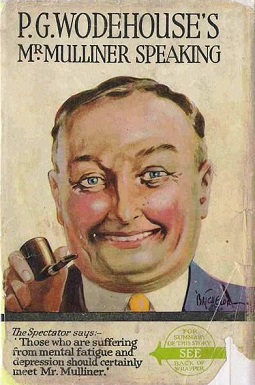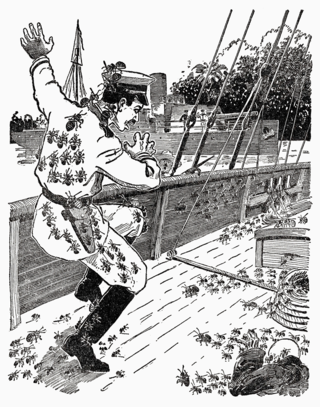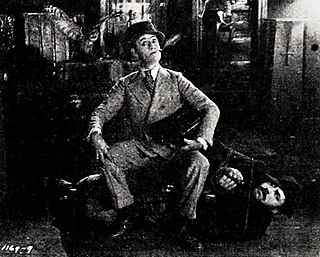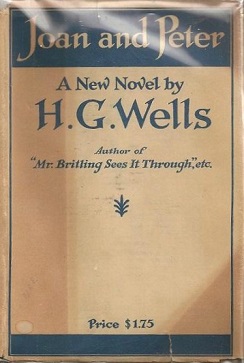
Bertram Wilberforce Wooster is a fictional character in the comedic Jeeves stories created by British author P. G. Wodehouse. An amiable English gentleman and one of the "idle rich", Bertie appears alongside his valet, Jeeves, whose intelligence manages to save Bertie or one of his friends from numerous awkward situations. Bertie Wooster and Jeeves have been described as "one of the great comic double-acts of all time".

Uncle Dynamite is a novel by P. G. Wodehouse, first published in the United Kingdom on 22 October 1948 by Herbert Jenkins, London and in the United States on 29 November 1948 by Didier & Co., New York. It features the mischievous Uncle Fred, who had previously appeared in Uncle Fred in the Springtime (1939).

"The Land Ironclads" is a short story by British writer H. G. Wells, which originally appeared in the December 1903 issue of the Strand Magazine. It features tank-like "land ironclads," 80-to-100-foot-long armoured fighting vehicles that carry riflemen, engineers, and a captain, and are armed with semi-automatic rifles.

Mr. Mulliner Speaking is a collection of nine short stories by P. G. Wodehouse. It was first published in the United Kingdom on April 30, 1929, by Herbert Jenkins, and in the United States on February 21, 1930, by Doubleday, Doran. The stories were originally published in magazines in the UK and the US between 1924 and 1929.

Moetan (もえたん) is a series of English language study aids published by SansaiBooks in Japan. Targeted at otaku, it attempted to teach English words using examples drawn from computer games and anime.

Ernest Charles Temple Thurston was a British poet, playwright and author.

Little Bear, also known as Maurice Sendak's Little Bear, is a Canadian children's animated television series produced by Nelvana Limited in association with the Canadian Broadcasting Corporation. It is based on the Little Bear series of books, which were written by Else Holmelund Minarik and illustrated by Maurice Sendak. In the United States, the show premiered on Nickelodeon as part of the Nick Jr. block on November 6, 1995, until the final episode aired on June 1, 2001. The show also aired on CBS on Saturday mornings from September 16, 2000, until September 15, 2001.
Written in the late 19th century by H. G. Wells and first published in The Butterfly, and collected in The Obliterated Man and Other Stories, "A Vision of Judgment" is a short story in 9 sections. It portrays a Last Judgment in which God and the archangel Gabriel laugh at sinners and saints alike, embarrassing them until they flee "up the sleeve of God." After every human soul has taken shelter there, all of humanity, "enlightened" and "in new clean bodies," is given a second chance. God shakes them—or rather us—"out of his sleeve upon the planet he had given us to live upon, the planet that whirled about green Sirius for a sun," saying "now that you understand me and each other a little better. . . . try again."

"Donkeyskin" is a French literary fairytale written in verse by Charles Perrault. It was first published in 1695 in a small volume and republished in 1697 in Perrault's Histoires ou contes du temps passé. Andrew Lang included it, somewhat euphemized, in The Grey Fairy Book. It is classed among folktales of Aarne-Thompson type 510B, unnatural love.

"The Empire of the Ants" is a 1905 short story by H. G. Wells about the littleness of humanity and the tenuousness of the dominion Homo sapiens enjoys on Earth. A 1977 film, Empire of the Ants, was loosely based on Wells' story.

Vernon Bruce Dent was an American comic actor, who appeared in over 400 films. He co-starred in many short films for Columbia Pictures, frequently as the foil, main antagonist, and an ally to The Three Stooges.
Little Catskin is an American fairy tale from Kentucky, collected by Marie Campbell in Tales from the Cloud Walking Country, listing her informant as Big Nelt.

H. G. Wells was a prolific writer of both fiction and non-fiction. His writing career spanned more than sixty years, and his early science fiction novels earned him the title of "The Father of Science Fiction".

William Irving was a German-born American film actor.
"Triumphs of a Taxidermist" is an 1894 short story by British writer H. G. Wells. The story was originally published anonymously in the March 3 and 15, 1894 issues of the Pall Mall Gazette and later published in the 1895 short story collection The Stolen Bacillus and Other Incidents.
"The Pearl of Love" is a 1925 short story about devotion by H. G. Wells.

The Way the World Is Going is a 1928 nonfiction book written by British author H. G. Wells.
Ernest Benn Limited was a British publishing house.

Joan and Peter, a 1918 novel by H. G. Wells, is at once a satirical portrait of late-Victorian and Edwardian England, a critique of the English educational system on the eve of World War I, a study of the impact of that war on English society, and a general reflection on the purposes of education. Wells regarded it as "one of the most ambitious" of his novels.

After the Storm is a 2001 American adventure film starring Benjamin Bratt, Mili Avital, Armand Assante, and Simone-Élise Girard. The story centers around the efforts of a group of people to salvage valuables from a sunken yacht in the Bahamas in 1933 and their schemes to betray and double-cross one another.













